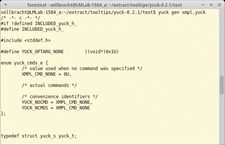Tool tests on the fast track
Tool Tips

Article from Issue 185/2016
We test Yuck, Uftpd, Guncat, Kiwix, Miller, and Debian Package Search.
Yuck 0.2.1
Function: Command-line parser for C
Source: http://www.fresse.org/yuck
License: BSD
[...]
Use Express-Checkout link below to read the full article (PDF).
Buy this article as PDF
Download Article PDF now with Express Checkout
Price $2.95
(incl. VAT)
(incl. VAT)